Ultimate Nitric Oxide Supplements Guide For Athletes
Author:
Reviewed by:
(Certified Nutritionist, S&C specialist, M.Sc.Eng. Biotechnology)
Unlock your full potential by engaging with our experts and community! Have questions about your fitness journey or looking for expert advice on weightlifting techniques? Don’t hesitate — leave a comment below and Oleksandr Maksymenko will provide a personalized answer and insights to help you reach your goals.
Torokhtiy is reader-supported. Some links are affiliate links, and we may earn a commission at no extra cost to you. See our disclosure page for details.
Nitric oxide supplements are becoming more and more popular with athletes. NO (nitric oxide) is a molecule that plays a big part in promoting blood flow, improving endurance, and boosting performance overall. They can help increase the production of nitric oxide in your body, which will result in better oxygen delivery tot he muscles, less fatigue, and better recovery.
If you don’t quite understand the benefits or even what these supplements, are, you’ve come to the right place – we’ll help you understand everything about them.
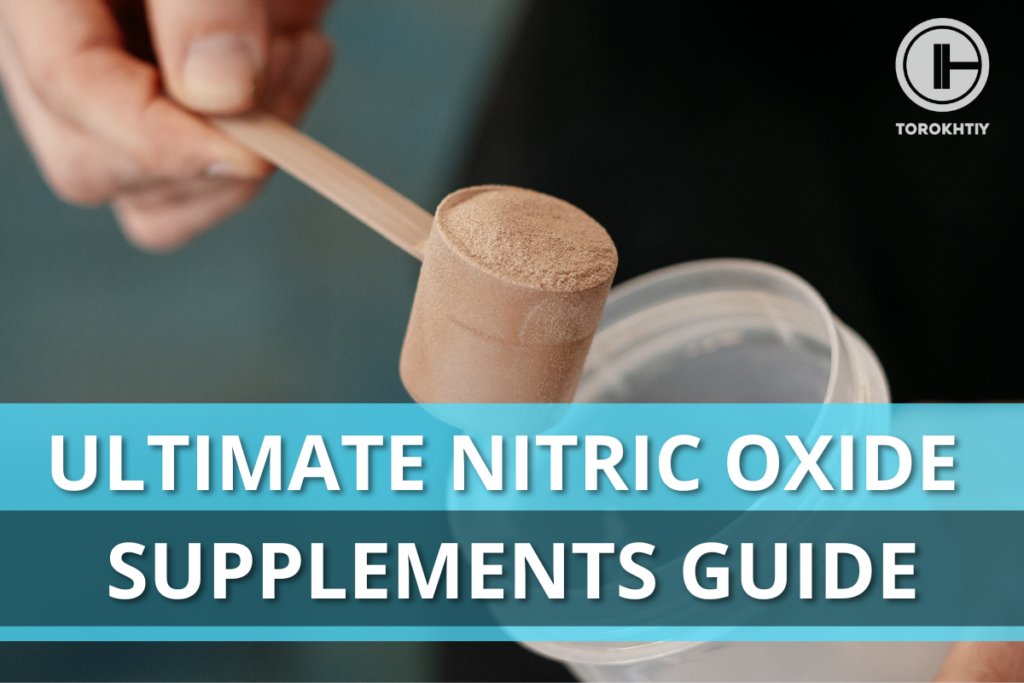
What Is Nitric Oxide and Why Do Athletes Need It?
Nitric Oxide (NO) is a compound that plays many different roles in the body, including dilating blood vessels, and stimulating hormone release. The reason this is beneficial for athletes is specifically related to the dilation of blood vessels.
When blood vessels are dilated, increased blood flow occurs. When exercising, this blood is directed to working muscles. This will in turn increase the “pump” effect experienced while weightlifting, as well as increase performance because more oxygen is being brought to the muscles.
You can also use a nitric oxide supplement for vascularity, as the better your blood is flowing, the veinier you will appear. It’s also thought that this increase in vasodilation and blood flow will lead to improved recovery.
All these benefits lead many athletes to seek out NO boosting supplements. As you can see from our product reviews, there is plenty of debate surrounding the efficacy of these supplements. The 2 main ingredients thought to contribute to increased NO production are Arginine and L-Citrulline.
Ernesto Mendez noted:
«NO supplements that increase plasma levels of arginine, can improve fitness and health. Research shows they can enhance exercise performance, support cardiovascular health, increase muscle pump, and enhance recovery.»
From our research, it appears that Arginine has not produced significant ergogenic effects with supplementation, while L-Citrulline has. This means to maximize the effects of NO production, we recommend focusing on supplements with high concentrations of L-Citrulline instead of Arginine.
It’s worth noting that most NO supplements do contain both ingredients, despite the lack of research backing up the use of Arginine as a supplement.
While an ingredient like L-Citrulline will likely boost performance because of increased NO production, it should be clear that athletes don’t need NO to perform well. Like any other supplement, it should be seen as a boost, and not something that’s mandatory to have a good workout. You can absolutely perform at a high level without any Nitric Oxide supplements.
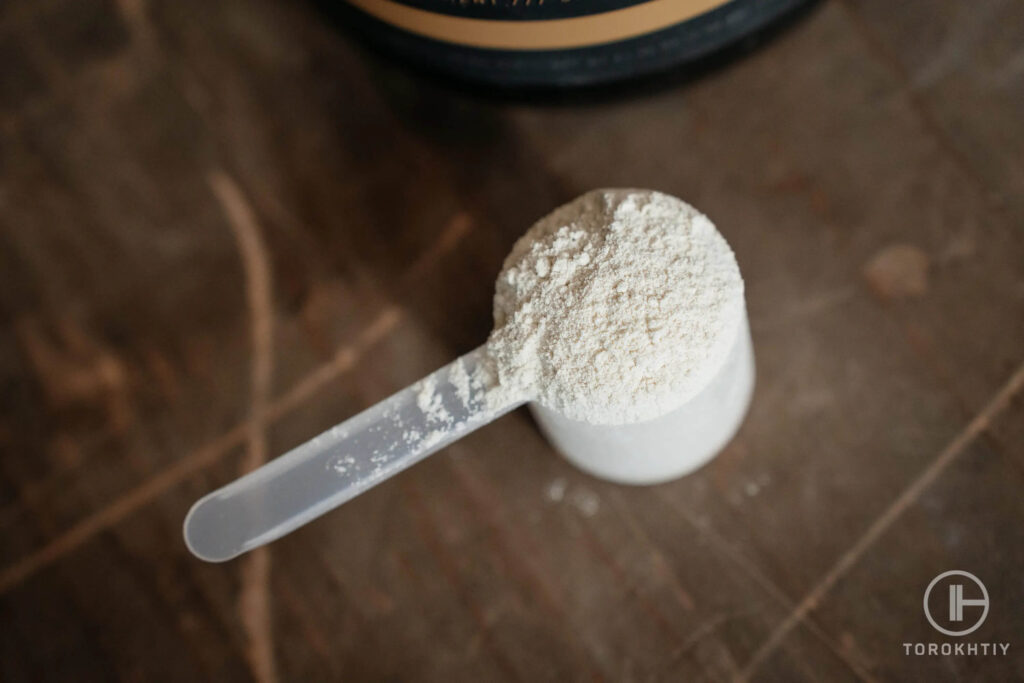
Which Supplements Have the Best Nitric Oxide Boosting Potential?
There are several ingredients that are touted to have nitric oxide boosting potential as we’ve covered in this article. The 2 main ingredients that fall into this category are Citrulline and Arginine. There are several other ingredients which show promise as well, namely L-Glutathione.
Below we’ll be going over each of these ingredients in depth, to see whether or not they’re genuinely useful for boosting Nitric Oxide in the body.
1. L-Citrulline/Citrulline Malate
Before getting into the benefits of L-Citrulline and Citrulline Malate in terms of NO boosting, let’s quickly cover the differences between the 2 ingredients. Essentially, Citrulline Malate is just L-Citrulline bonded with malic acid. This is typically done at a 2:1 ratio and is meant to help with digestion, and to provide a slower release in the body.
A similar process is done with caffeine to produce dicaffeine malate. These ingredients have the same effects, despite being dosed slightly differently, and having slightly different names.
So, how do these 2 similar ingredients affect Nitric Oxide production in the body? L-Citrulline is turned into NO by the body when consumed, thus leading to increased vasodilation and all the positive effects associated with increased NO. It is for this reason that L-Citrulline has been shown to increase performance through improvements in anaerobic exercise and reduced soreness.
These benefits were shown with 8g of Citrulline Malate (Equivalent to roughly 5.3g of L-Citrulline), but we can assume lower doses would produce similar, albeit less powerful effects.
These measured results from L-Citrulline/Citrulline Malate supplementation and its effect on performance are why it’s the main ingredient we focused on in this list. If you’re seeking a nitric oxide boosting ingredient that will produce significant ergogenic effects, the main ingredient we recommend looking for is L-Citrulline or Citrulline Malate in relatively high doses.
2. Arginine
As you may have noticed from our list, the vast majority of products we’ve covered contain arginine in some form. Whether it be arginine nitrate, arginine silicate, or arginine alpha-ketoglutarate, will these ingredients produce meaningful results in performance as a result of increased nitric oxide?
From our research, the answer appears to be no. One in-depth study on arginine seeking to determine its possible ergogenic benefits came up with the finding that it has little benefit as an ergogenic aid.
They pointed to studies that promoted the use of arginine for ergogenic effects, but showed that these studies included l-citrulline, which was likely responsible for the effects attributed to arginine.
The study arguing against the use of arginine did cite several previous studies which promoted the use of Arginine as a sports supplement. However, even with these previous findings, upon further research and testing, they came to the conclusion that arginine did not produce any significant ergogenic effects.
These findings lead us to believe that arginine supplementation will not produce meaningful results in Nitric Oxide production despite popular belief. With this being said, arginine is easily one of the most common ingredients found in NO-based supplements.
While there doesn’t necessarily appear to be any downside to taking arginine, it doesn’t appear like there is much benefit either. It’s for this reason we recommend prioritizing L-Citrulline instead when looking for a formula to help boost NO production.
3. Glutathione
Finally, the other potential nitric oxide boosting ingredient we covered on our list is Glutathione. This is a much less common ingredient than the previous 2 we mentioned, and it’s only found in 3 of the products on our list (Transparent Labs, Jacked Factory NO XT, & Ghost). So, how does it compare to L-Citrulline and Arginine?
Glutathione is a powerful antioxidant that reduces cellular oxidative stress levels and protects cells by reducing reactive oxygen species, which can be beneficial during physical work. However, there doesn’t appear to be much research on its effects directly regarding exercise performance. For this reason, it’s difficult to say whether or not it will produce any meaningful results.
However, there are studies that show it does have a distinct effect on blood, specifically on the function of natural killer cells.. This does appear to correlate with increased immune defense, which is an obvious pro in regards to total health.
The researchers state that glutathione is likely beneficial for disease prevention and immune health, but they don’t indicate any function for exercise performance.
Therefore, it appears to be a potentially beneficial ingredient for overall health, even if it doesn’t directly improve NO production or exercise performance. While we wouldn’t necessarily consider it an NO-boosting ingredient, it does appear to have some genuine health benefits associated with it.
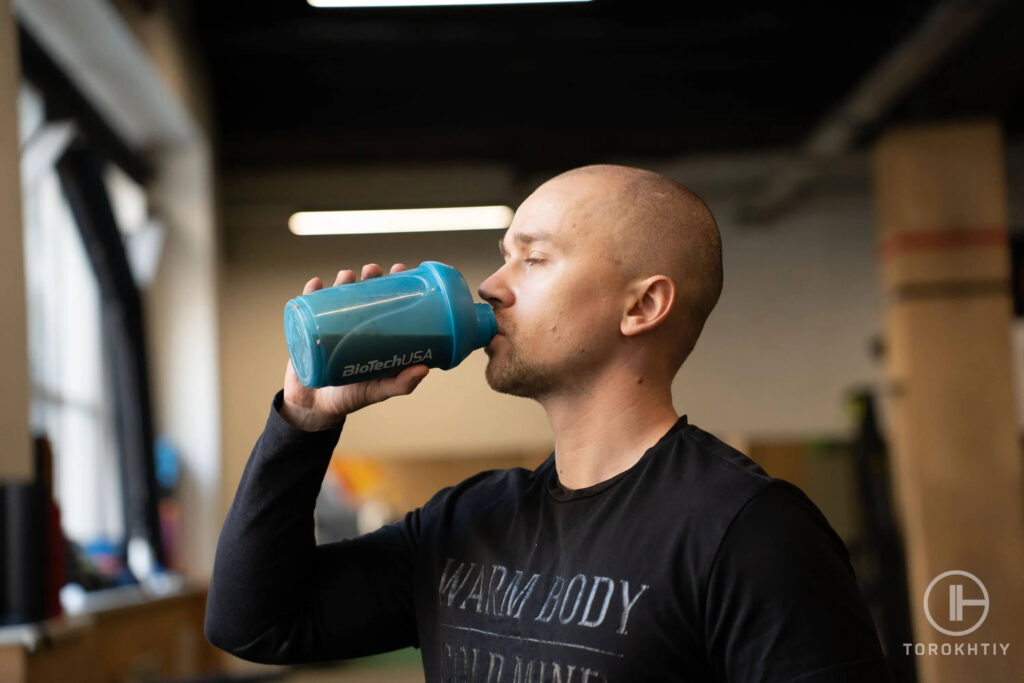
How to Find the Best Nitric Oxide Supplements?
There are several factors that go into making an NO supplement effective. These include L-Citrulline content, additional ergogenic ingredients, taste, and value for money. Note that we won’t be mentioning arginine here, because as we’ve already covered, it likely isn’t the best choice for boosting NO in search of ergogenic effects.
1. L-Citrulline Content
Based on everything we’ve covered so far, it should be clear that the main factor to consider when looking for a nitric oxide supplement is its L-Citrulline content.
This is because it is the most scientifically-backed and proven nitric oxide boosting ingredient in terms of measurable ergogenic effects. We recommend prioritizing L-Citrulline content when looking for a high-quality nitric oxide formula.
You may still be wondering how much L-Citrulline is enough to produce meaningful results. The study we’ve been using on L-Citrulline showed its results from 8g of citrulline malate (equivalent to roughly 5.33g of pure L-Citrulline).
This means to ensure the best results possible we recommend seeking out a product at a similar dose. However, you should still see similar results at a slightly lower dose, so around 6g of citrulline malate or 4g of l-citrulline is also acceptable.
2. Additional Ergogenic Ingredients (Betaine, Beta-Alanine, Creatine)
Now, although they aren’t directly related to nitric oxide production, there are a handful of other active ingredients you should keep an eye out for when deciding on a nitric oxide supplement. These 3 ingredients are betaine, beta-alanine, and creatine.
The reason we’re specifically highlighting these ingredients is because they are some of the most research-backed and effective ingredients for producing ergogenic effects. They all have similar, although slightly different effects, which are covered more in-depth below.
Betaine is the most common additional active ingredient found on our list, being included in 4 of the 10 products on our list (Transparent Labs, Huge, Legion, and Jacked Factory Pump Surge). All 4 of the products on our list that contain betaine have effective doses of 1.5-2.5g, with anything over 1.25g being considered effective. Betaine has been shown to increase force production, as well as muscular endurance.
Beta-Alanine is only found in 2 supplements on our list (ProSupps, and Legion). Any significant dose is considered effective, with the supplements on our list containing a solid 3.2-3.6g respectively. Beta-Alanine supplementation increases power output as well as reducing fatigue.
Keep in mind that such doses of beta-alanine can cause side effects such as skin rashes and paresthesia – a tingling sensation on the skin. It’s not dangerous, but it can be uncomfortable.
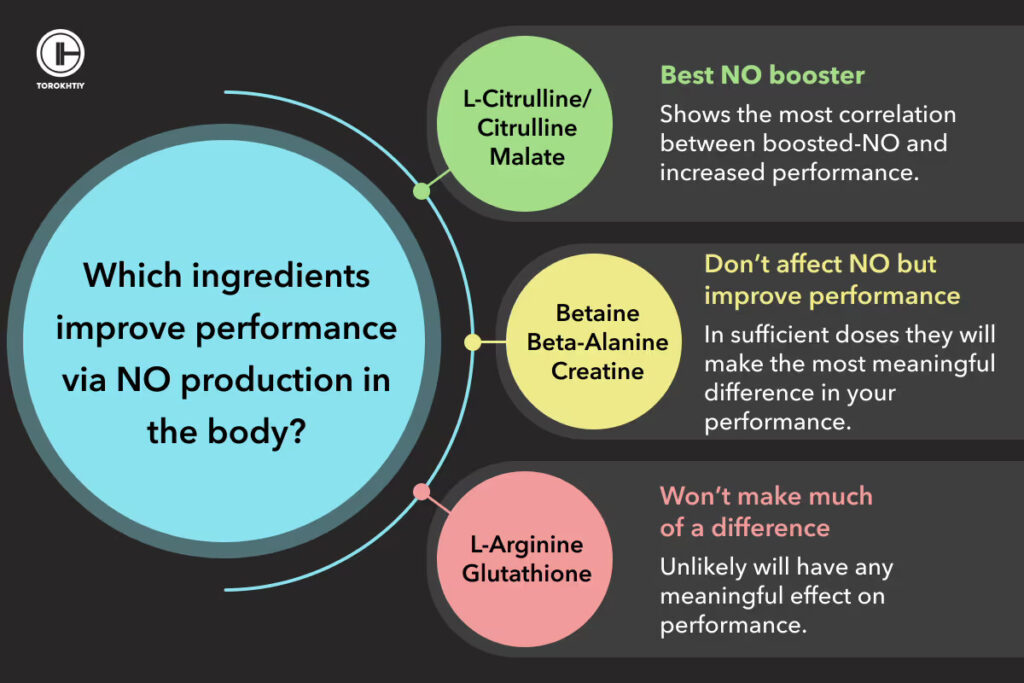
Finally, despite Creatine being one of the most widely-used sports supplements available, it’s only found in 1 product on our list, ProSupps. While the standard recommended dose is 3-5g daily, ProSupps only contains 1g per serving.
While this amount may still produce some results, for maximal effects, we recommend taking an additional creatine supplement. Creatine is specifically useful for improving high-intensity exercise performance.
Overall, despite not being entirely related to nitric oxide production, these 3 ingredients have all been shown to produce measurable results in terms of athletic performance and recovery, making them beneficial to most athletes.
3. Taste/Flavor
Although not as relevant as the other 2 factors we just covered, you should absolutely consider taste and flavor before making a decision when buying any kind of supplement. It can be difficult to gauge whether or not a supplement will have an enjoyable taste, so we recommend checking user reviews to determine this. This can also be a good way to check the overall quality of a supplement.

Of course, taste is a matter of personal preference so it may take some trial and error before you find a supplement you truly enjoy the flavor of. You may also prefer a purely unflavored supplement, or capsules instead. It may be worth experimenting with a few different supplements to find a flavor that’s right for you.
4. Value for Money
Finally, one of the other most important factors to consider whenever you buy a supplement is the value you’re getting for your money. This goes beyond simply how much you’re paying for a product, but the overall quality of the supplement you’re getting as well.
Consider things like ingredients, doses, and price per serving to determine for yourself how much value a certain product has. From here you can compare different products to determine which one will provide you with the most value for your money. By doing this, you can be confident you’re making an informed decision.
PUMP by Transparent Labs
- Form: Powder
- Ingredients: L-Citrulline, Arginine Nitrate, L-Glutathione, Betaine
- Flavors: Blue Raspberry, Strawberry Lemonade
- Package Information: 1.31lbs
- Serving Size: 19.8g
- Price Per Serving: ~$1.67
- Company Founded: 2012
- Recommended by Athletes: Hafthor Bjornsson, Paul Sklar, Sean Harris
The primary ingredient we’ll be focusing on in this article is L-Citrulline. This is because L-Citrulline increases nitric oxide production and blood flow in the body, as well as improving overall exercise performance.
Transparent Labs contains a solid dose, with 8g of citrulline malate. Note that citrulline malate is l-citrulline bonded to malic acid at a 2:1 ratio. This is meant to help with digestion and give a slower release, but it has the same core effects as pure l-citrulline.
The other main purported Nitric Oxide boosting ingredients found in Pump are Arginine Nitrate, and L-Glutathione.
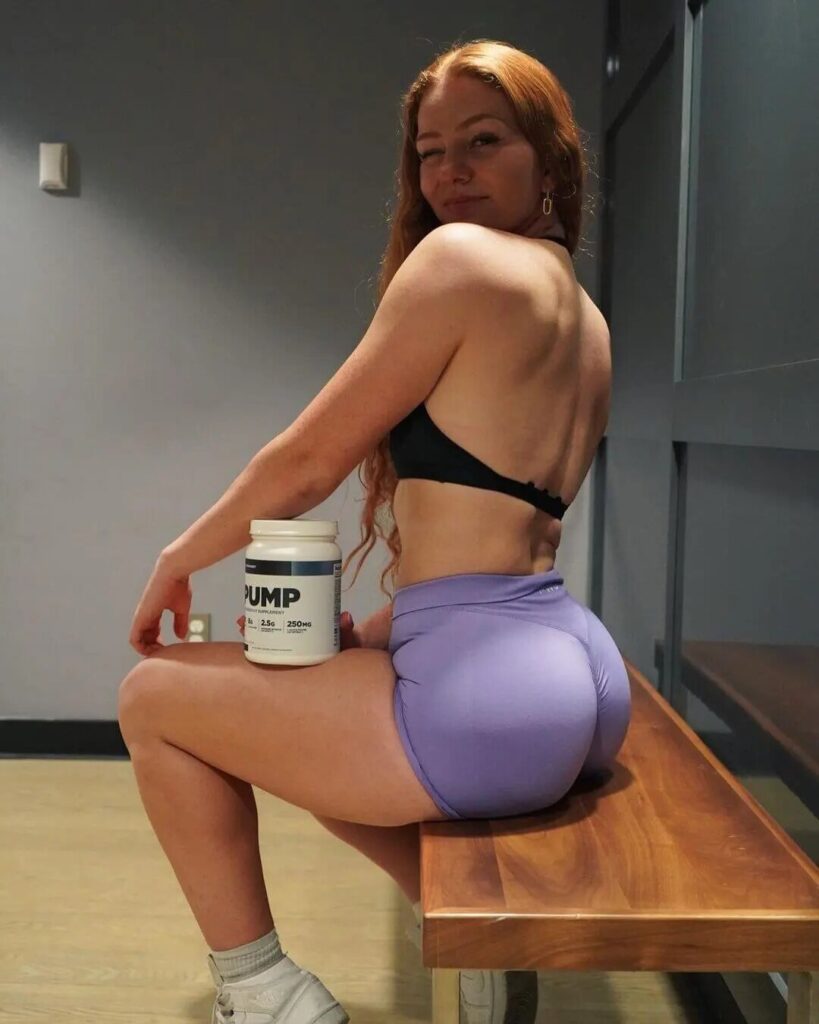
Another active ingredient not necessarily related to Nitric Oxide found in Pump is Betaine. Betaine is shown to increase endurance as well as total force production through supplementation, so it’s one of the most useful active ingredients in exercise supplements. Pump contains a solid 2.5g dose of the ingredient in each serving.
At around $1.67 per serving, this falls around the average price point. for our list. It comes in only 2 flavors, but is made with all natural ingredients, like all of Transparent Labs products.
How to Take Nitric Oxide Supplements?
While nitric oxide is slightly different from pre-workout supplements, mostly because of the difference in caffeine content, they are still taken in a similar manner to pre-workout. You’ll want to take nitric oxide supplements directly before your workout to maximize their ergogenic effects.
However, you may still be wondering when exactly to take them. To maximize the effects of l-citrulline specifically, we recommend taking nitric oxide supplements about an hour before your workout. This will give the citrulline plenty of time to act on your body so you can reap all the benefits of the ingredient.
Our expert Dina Al-Rubaye wanted to inform and warn you:
«Nitric oxide (NO) supplements enhance blood flow, potentially benefiting athletes for improved performance, individuals with hypertension for blood pressure management, and those with erectile dysfunction. They may also support heart health, cognitive function, diabetes management, and aid recovery after surgery or injury.
However, consulting a healthcare professional is essential due to potential side effects, interactions with medications, and the influence of dietary and lifestyle factors on nitric oxide production.»
In terms of how to take nitric oxide supplements, we recommend following the instructions on the package of whatever product you purchase. Typically, you will mix 1 scoop of the supplement with 1-2 glasses of water or a beverage of your choice.
If you choose an unflavored supplement, you may prefer to mask the potentially unpleasant taste with something like juice. Also, if you choose a capsuled nitric oxide, we also recommend following the instructions on the package.
It’s a good rule of thumb with most supplements to not exceed the recommended serving size. Most supplements are formulated to be effective in their recommended dose, so there shouldn’t be much of a reason to use a higher dose. Use plenty of discretion, and consult with a doctor if you plan on taking multiple servings at a time.
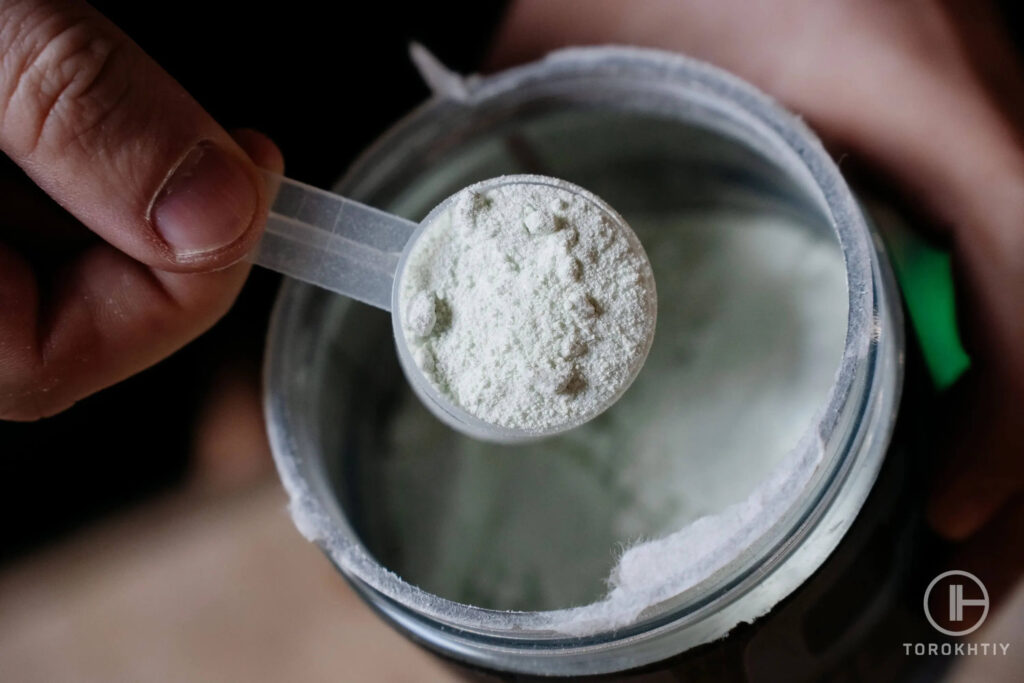
How to Increase the Pumping Effect With Training?
Nitric oxide supplements are a great way to boost the pumping effect you experience while training. This is because they stimulate blood flow to your muscles, which leads to stronger and fuller pumps. So, if a great pump is what you’re after, you may be wondering how to get better pumps through training alone.
Before we get into it, it’s worth noting that a huge pump isn’t necessarily a sign that you’re training with proper intensity or technique. Many beginning lifters confuse the feeling of a pump with progress.
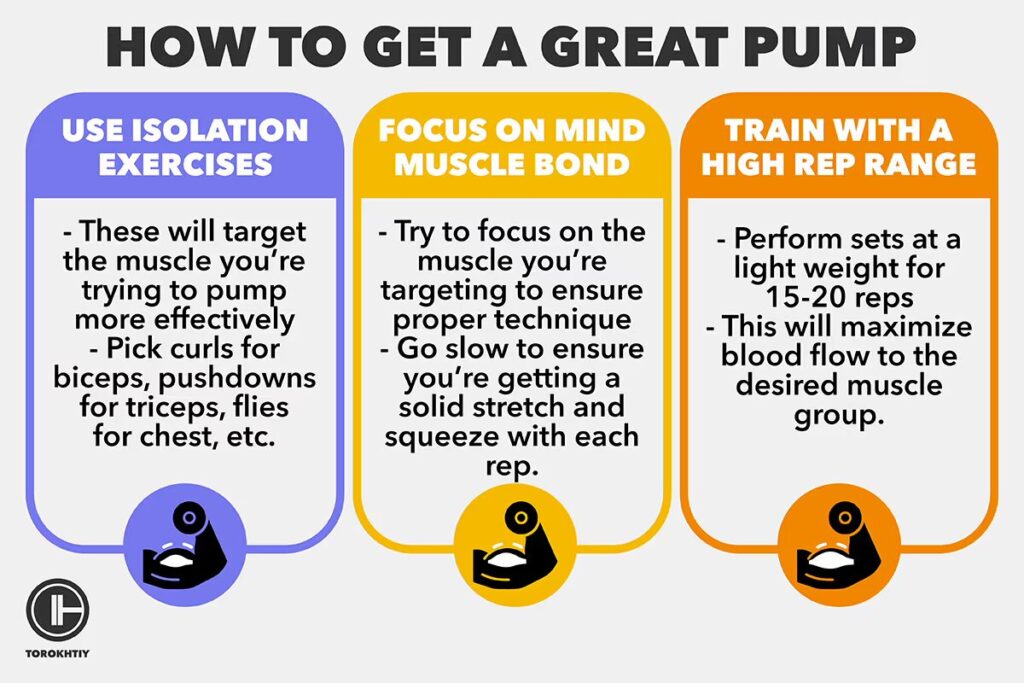
Remember that a pump is just blood rushing to the muscles, and this will happen with any repetitive exertion no matter how small. If a pump’s all you’re after, simply flexing the target muscle over and over again will lead to a huge pump – keep in mind that this is still not an effective way to train!
With that being said, there’s nothing wrong with incorporating some pump-focussed lifts into your routine – because, let’s be honest, who doesn’t love the feeling of a great pump? If this is what you’re after, we recommend doing isolation exercises for your target muscle group in high rep ranges of around 12-20.
Think curls for biceps, pushdowns for triceps, and leg extensions for quads. While this likely isn’t an optimal way to put on muscle, the pump you’ll experience after training in this style will be absolutely massive (especially when paired with a great nitric oxide supplement).
What You Should Know About the Possible Risks of Nitric Oxide Supplements?
While there are some clear benefits to taking nitric oxide supplements, there are a few risks to keep in mind before using nitric oxide.
The main risk associated with nitric oxide supplements related to low blood pressure/hypotension. If someone has low blood pressure, nitric oxide supplements may lead to even lower blood pressure, which may lead to dizziness, fainting, or fatigue. If you’re concerned about your blood pressure, be sure to consult with a doctor before use.
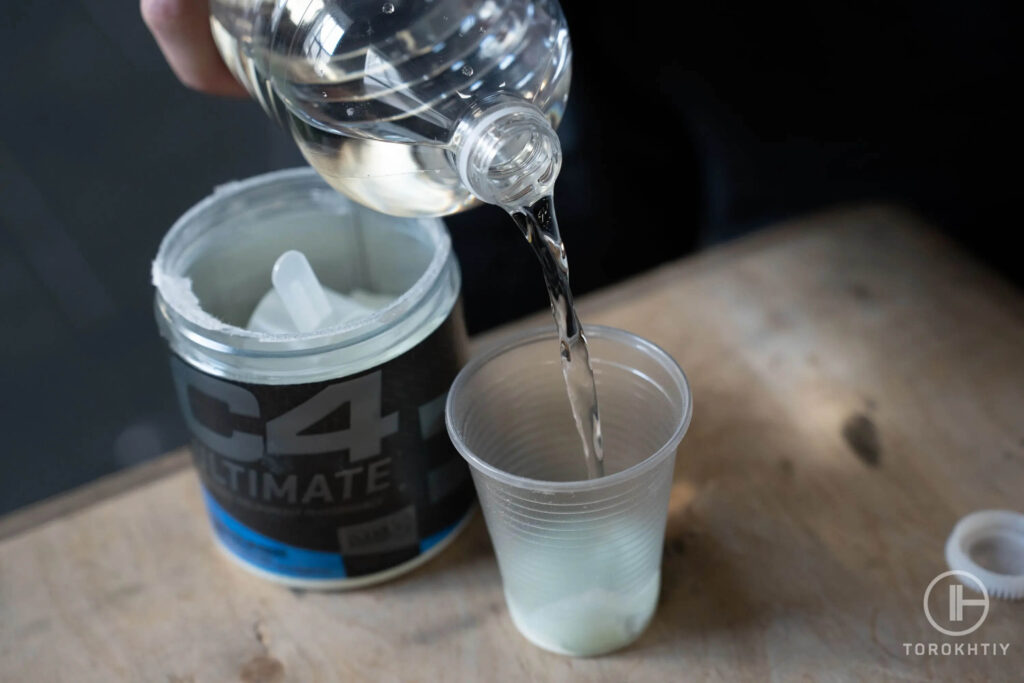
Other conditions that may be negatively affected by nitric oxide supplements include cardiac issues, kidney disease, herpes, and cardiovascular issues. Overall, be sure to consult with a doctor if you’re concerned about how NO supplements may affect you.
It’s worth noting that doctor’s will also generally recommend avoiding nitric oxide supplements ahead of surgery to avoid any interference with your normal blood pressure. It’s also possible that nitric oxide supplements will interfere with medications.
If you have any pre-existing medical conditions, or are taking any medication, we recommend consulting with a doctor before using nitric oxide (or any performance enhancers) supplements. While they should be well-tolerated in most individuals, exercise caution before using these supplements.
FAQ
Is It Safe to Use Supplements With Nitric Oxide?
While there doesn’t appear to be any major side effects for nitric oxide workout supplements in healthy individuals, arginine specifically may not be safe for those with existing cardiac conditions. With any supplement, we recommend doing thorough research, and consulting with a doctor before use, especially if you have any pre-existing health problems.
What Supplement Increases Nitric Oxide the Most?
The ingredient that appears to have the highest nitric oxide boosting effects is L-Citrulline. For this reason, we decided to highlight this ingredient in the products covered on our list. It’s difficult to say which supplement will boost your nitric oxide the most, but our top pick for the strongest nitric oxide booster is PUMP by Transparent Labs. This is specifically a great choice for its high citrulline content!
What Is the Best Natural Nitric Oxide Booster?
As mentioned above, the best natural ingredient for boosting nitric oxide is l-citrulline. Citrulline is a completely natural amino acid which was first isolated from watermelon! It has been shown to increase nitric oxide which leads to measurable increases in performance and recovery.
Conclusion
If you’re looking for a way to get better pumps and improve your performance in the gym, you may want to try out a nitric oxide boosting supplement! Largely powered by l-citrulline, and backed up by several other key active ingredients, these supplements can give you a powerful boost in the gym. Our recommendation is PUMP by Transparent Labs, but if you want to try to find a nitric oxide supplement on your own, now you know how to do that.
We hope you were able to learn something, and that you can use this article as a guide to make an informed decision on which product to buy. Let us know if you decide to try our recommended product, we’d love to hear your thoughts in the comments below!
Experts Who Contributed To This Article
Orthopedic Clinical Specialist (OCS)
Professional Nutritionist and Certified Coach

Also read:
- Best Post Workout Recovery Drink
- Ashwagandha For Athletes
- Bcaa Benefits For Women
- Powerlifters Diet
- Muscle Recovery Supplements Guide
- Electrolyte Supplements Guide
References:
- Adam M Gonzalez “Effects of Citrulline Supplementation on Exercise Performance in Humans: A Review of the Current Literature” J Strength Cond Res. 2020 May;34(5):1480-1495
- Claudia Mello Meirelles “Acute Effects of L-Arginine Supplementation on Oxygen Consumption Kinetics” International Journal of Exercise Science”
- Matthew Solovey “Research shows oral supplement increases body’s storage of antioxidant” APRIL 22, 2013.
- Jenna Mae Apicella “The Effect of Betaine Supplementation on Performance and Muscle Mechanisms” University of Connecticut 2011 1-75.
- Marjorie S. Miller “To beet or not to beet? Researchers test theories of beet juice benefits” JANUARY 19, 2015
- Tom Clifford “The Potential Benefits of Red Beetroot Supplementation in Health and Disease” Nutrients. 2015 Apr; 7(4): 2801–2822
- Dale R “Hyperhydrating with glycerol: Implications for athletic perfomance” Journal of the American dietetic association, February 1999
- “The Power of Pomegranate” NewsCenter
- Eric T Trexler “International society of sports nutrition position stand: Beta-Alanine” J Int Soc Sports Nutr. 2015 Jul 15;12:30.
- Richard B Kreider “International Society of Sports Nutrition position stand: safety and efficacy of creatine supplementation in exercise, sport, and medicine” J Int Soc Sports Nutr. 2017 Jun 13;14:18
- MAGI Euregio, Bolzano “Dietary supplements for improving nitric-oxide synthesis” J Prev Med Hyg. 2022 Jun; 63(2 Suppl 3): E239–E245
- Gene Bruno “Nitric Oxide Boosters” Smart Supplementation 2009
- Joaquín Pérez-Guisado “Citrulline malate enhances athletic anaerobic performance and relieves muscle soreness” J Strength Cond Res. 2010 May;24(5):1215-22
- Stephen J Bailey “Acute L-arginine supplementation reduces the O2 cost of moderate-intensity exercise and enhances high-intensity exercise tolerance” J Appl Physiol (1985). 2010 Nov;109(5):1394-403
- “3 supplements that may harm your heart” Harvard Health Publishing. January 1, 2021
- Photos made by Torokhtiy Media Team
Why Trust Us?
With over 20 years in Olympic weightlifting, strength training, nutrition coaching, and general fitness our team does its best to provide the audience with ultimate support and meet the needs and requirements of advanced athletes and professional lifters, as well as people who strive to open new opportunities and develop their physical capabilities with us.
By trusting the recommendations of our certified experts in coaching, nutrition, and sports training programming, as well as scientific consultants, and physiotherapists, we provide you with thorough, well-considered, and scientifically proven content. All the information given in the articles concerning workout programming, separate exercises, and athletic performance, in general, is based on verified data.
The product testing process is described in more detail here.
Author: Oleksandr Maksymenko
Certified Sports Nutritionist,
MSc Sports Dietetics
Specializing in: Weight management, Fitness / Sports nutrition
Oleksandr is a professional fitness nutritionist certified by the Fitness Professional Association (FPA). He follows the principles of evidence-based dietetics and fosters a healthy relationship with food in his clients, ensuring there are no strict prohibitions on their favorite foods or frequent lapses. His primary goal is not only to achieve results for you but also to sustain them over the long term, all while enjoying tasty and delicious food.
Reviewed by: Jacek Szymanowski
Certified Nutritionist,
M.Sc.Eng. Biotechnology
Performance architect,
Strength and Conditioning Specialist
With over 30 years of fighting experience, specialization in nutrition coaching for athletes, and expertise in metabolic health and dietary strategies, Jacek offers a comprehensive approach to optimizing your performance and well-being. Backed by a Master of Science degree in Biotechnology, Jacek remains at the forefront of scientific advancements, ensuring that his coaching is always evidence-based and up-to-date.




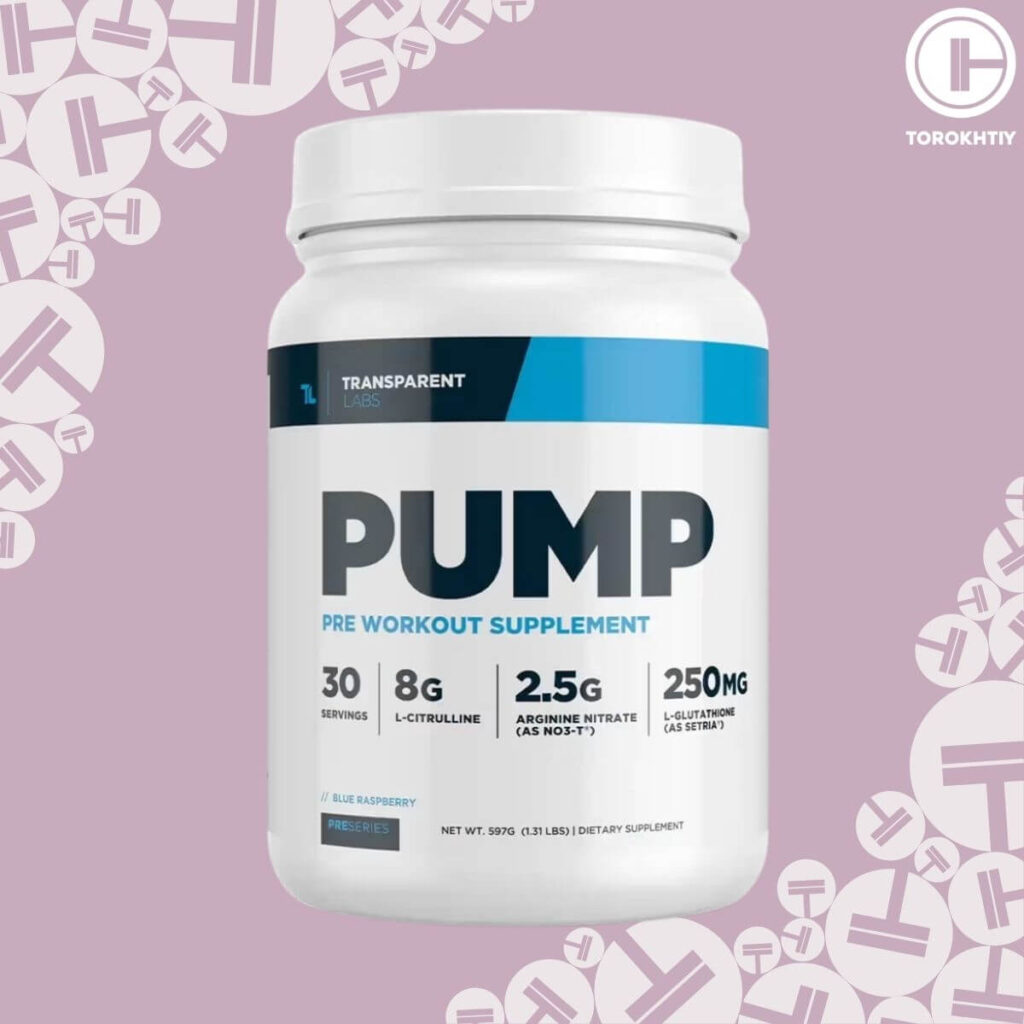


Still have questions after reading our article? Unlock your full potential by engaging with our experts and community! Don’t hesitate — leave a comment below and Oleksandr Maksymenko will provide a personalized answer and insights to help you reach your goals.